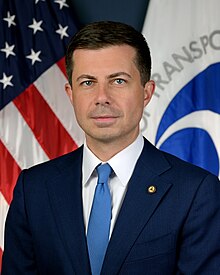United States Secretary of Transportation
The United States secretary of transportation is the head of the United States Department of Transportation. The secretary serves as the principal advisor to the president of the United States on all matters relating to transportation. The secretary is a statutory member of the Cabinet of the United States, and is fourteenth in the presidential line of succession.[1]
| United States Secretary of Transportation | |
|---|---|
 Seal of the Department of Transportation | |
 Flag of the secretary | |
since February 3, 2021 | |
| United States Department of Transportation | |
| Style | Mr. Secretary (informal) The Honorable (formal) |
| Member of | the United States Cabinet |
| Reports to | the President of the United States |
| Seat | Washington, D.C. |
| Appointer | President of the United States with Senate advice and consent |
| Term length | No fixed term |
| Constituting instrument | 49 U.S.C. § 102 |
| Formation | October 15, 1966 |
| First holder | Alan Stephenson Boyd |
| Succession | Fourteenth[1] |
| Deputy | Deputy Secretary of Transportation |
| Salary | Executive Schedule, Level I |
| Website | transportation.gov |
The secretary of transportation oversees the U.S. Department of Transportation, which has over 55,000 employees and thirteen agencies, including the Federal Aviation Administration, the Federal Highway Administration, the Federal Railroad Administration, and the National Highway Traffic Safety Administration.[2] As of January 2021, the secretary receives an annual salary of $221,400.[3][4]
Pete Buttigieg has served as the secretary of transportation since February 3, 2021. He was confirmed by the United States Senate by a vote of 86–13 on February 2, 2021.[5] Buttigieg is the first openly gay man to hold the position, the first openly gay Cabinet secretary and the youngest person to serve as secretary of transportation.[6]
History
editThe post was created on October 15, 1966, by the Department of Transportation Act, signed into law by President Lyndon B. Johnson.[2] The department's mission is "to develop and coordinate policies that will provide an efficient and economical national transportation system, with due regard for need, the environment, and the national defense."[2]
The first secretary of transportation was Alan S. Boyd, nominated to the post by Democratic president Lyndon B. Johnson. Ronald Reagan's second secretary of transportation, Elizabeth Dole, was the first female holder, and Mary Peters was the second. Gerald Ford's nominee William Thaddeus Coleman Jr. was the first African American to serve as transportation secretary, and Federico Peña, serving under Bill Clinton, was the first Hispanic to hold the position, subsequently becoming the secretary of energy. Japanese-American Norman Mineta, who had previously been the secretary of commerce, is the longest-serving secretary, holding the post for over five and a half years,[2] and Andrew Card is the shortest-serving secretary, serving only eleven months. Pete Buttigieg is the youngest secretary, taking office at 39 years 15 days old, overtaking Neil Goldschmidt as the youngest secretary, taking office at 39 years 3 months old,[7] while Norman Mineta was the oldest, retiring at age 74.[8] In April 2008, Mary Peters launched the official blog of the secretary of transportation called The Fast Lane.[9] On January 23, 2009, the 16th secretary, Ray LaHood, took office, serving under the administration of Democrat Barack Obama; he had previously been a Republican congressman from Illinois for fourteen years.[10]
Anthony Foxx was the 17th U.S. secretary of transportation from 2013 to 2017, when Barack Obama was president. Elaine Chao, who served as the secretary of labor under President George W. Bush, was nominated by Donald Trump on November 29, 2016. On January 31, 2017, the Senate confirmed her appointment by a vote of 93–6. On January 7, 2021, Chao announced her resignation following the January 6 United States Capitol attack, effective January 11.[11] On January 11, 2021, acting deputy secretary of transportation Steven G. Bradbury became acting secretary of transportation.
List of secretaries of transportation
edit- Parties
Democratic (8) Republican (11)
- Status
Denotes acting Secretary of Transportation
| No. | Portrait | Secretary | State of residence | Took office | Left office | President | |
|---|---|---|---|---|---|---|---|
| 1 | Alan S. Boyd | Florida | January 16, 1967 | January 20, 1969 | Lyndon B. Johnson (1963–1969) | ||
| 2 | John Volpe | Massachusetts | January 22, 1969 | February 2, 1973 | Richard Nixon (1969–1974) | ||
| 3 | Claude Brinegar | California | February 2, 1973 | February 1, 1975 | |||
| Gerald Ford (1974–1977) | |||||||
| 4 | William Thaddeus Coleman Jr. | Pennsylvania | March 7, 1975 | January 20, 1977 | |||
| 5 | Brock Adams | Washington | January 23, 1977 | July 20, 1979 | Jimmy Carter (1977–1981) | ||
| 6 | Neil Goldschmidt | Oregon | September 24, 1979 | January 20, 1981 | |||
| 7 | Drew Lewis | Pennsylvania | January 23, 1981 | February 1, 1983 | Ronald Reagan (1981–1989) | ||
| 8 | Elizabeth Dole | Kansas | February 7, 1983 | September 30, 1987 | |||
| 9 | James H. Burnley IV | North Carolina | December 3, 1987 | January 20, 1989 | |||
| 10 | Samuel K. Skinner | Illinois | February 6, 1989 | December 13, 1991 | George H. W. Bush (1989–1993) | ||
| 11 | Andrew Card | Massachusetts | February 24, 1992 | January 20, 1993 | |||
| 12 | Federico Peña | Colorado | January 21, 1993 | February 14, 1997 | Bill Clinton (1993–2001) | ||
| 13 | Rodney E. Slater | Arkansas | February 14, 1997 | January 20, 2001 | |||
|
– |
Mortimer L. Downey III Acting |
Virginia | January 20, 2001 | January 25, 2001 | George W. Bush (2001–2009) | ||
| 14 | Norman Mineta | California | January 25, 2001 | August 7, 2006 | |||
|
– |
Maria Cino Acting |
New York | August 7, 2006 | October 17, 2006 | |||
| 15 | Mary E. Peters | Arizona | October 17, 2006 | January 20, 2009 | |||
| 16 | Ray LaHood | Illinois | January 23, 2009 | July 2, 2013 | Barack Obama (2009–2017) | ||
| 17 | Anthony Foxx | North Carolina | July 2, 2013 | January 20, 2017 | |||
| – | Michael Huerta Acting |
California | January 20, 2017 | January 31, 2017 | Donald Trump (2017–2021) | ||
| 18 | Elaine Chao | Kentucky | January 31, 2017 | January 11, 2021 | |||
| – | Steven G. Bradbury Acting |
Oregon | January 12, 2021 | January 20, 2021 | |||
| – | Lana Hurdle Acting |
Virginia | January 20, 2021 | February 3, 2021 | Joe Biden (2021–2025) | ||
| 19 | Pete Buttigieg | Indiana | February 3, 2021 | Incumbent | |||
Line of succession
editThe line of succession regarding who would act as Secretary of Transportation in the event of a vacancy or incapacitation is as follows:[12]
- Deputy Secretary of Transportation
- Under Secretary of Transportation for Policy
- General Counsel
- Assistant Secretary for Budget and Programs
- Assistant Secretary for Transportation Policy
- Assistant Secretary for Governmental Affairs
- Assistant Secretary for Aviation and International Affairs
- Assistant Secretary for Administration
- Administrator of the Federal Highway Administration
- Administrator of the Federal Aviation Administration
- Administrator of the Federal Motor Carrier Safety Administration
- Administrator of the Federal Railroad Administration
- Administrator of the Federal Transit Administration
- Administrator of the Maritime Administration
- Administrator of the Pipeline and Hazardous Materials Safety Administration
- Administrator of the National Highway Traffic Safety Administration
- Administrator of the Research and Innovative Technology Administration
- Administrator of the Great Lakes St. Lawrence Seaway Development Corporation
- Regional Administrator, Southern Region, Federal Aviation Administration
- Director, Resource Center, Lakewood, Colorado, Federal Highway Administration
- Regional Administrator, Northwest Mountain Region, Federal Aviation Administration
References
edit- General
- "Biographical Sketches of the Secretaries of Transportation". U.S. Department of Transportation. August 14, 2009. Archived from the original on March 16, 2011. Retrieved January 2, 2010.
- Specific
- ^ a b : Vacancy in offices of both President and Vice President; officers eligible to act.
- ^ a b c d Grinder, R. Dale. "The United States Department of Transportation: A Brief History". U.S. Department of Transportation. Archived from the original on July 17, 2004. Retrieved January 2, 2010.
- ^ "Salary Table No. 2021-EX Rates of Basic Pay for the Executive Schedule (EX)" (PDF).
- ^ : Positions at level I.
- ^ O'Connell, Oliver (February 2, 2021). "Pete Buttigieg becomes first openly gay cabinet member after historic Senate vote". The Independent. Retrieved February 2, 2021.
- ^ Shear, Michael D.; Kaplan, Thomas (December 16, 2020). "Buttigieg Recalls Discrimination Against Gay People, as Biden Celebrates Cabinet's Diversity". The New York Times. ISSN 0362-4331. Retrieved January 24, 2021.
- ^ Josephs, Leslie (February 2, 2021). "Senate confirms Pete Buttigieg as Transportation secretary". CNBC. Retrieved January 26, 2023.
- ^ "Biographical Sketches of the Secretaries of Transportation". U.S. Department of Transportation. August 14, 2009. Archived from the original on March 16, 2011. Retrieved January 3, 2010.
- ^ "A Chronology of Dates Significant in the Background, History and Development of the Department of Transportation". U.S. Department of Transportation. August 14, 2009. Archived from the original on February 15, 2008. Retrieved January 3, 2010.
- ^ "Ray LaHood—Secretary of Transportation". U.S. Department of Transportation. July 22, 2009. Archived from the original on September 28, 2012. Retrieved January 3, 2010.
- ^ Collins, Kaitlan; Diamond, Jeremy; Liptak, Kevin; Bennett, Kate (January 8, 2021). "Second Cabinet member announces resignation over Trump's response to riot". CNN.
- ^ Obama, Barack (January 14, 2009). "Executive Order 13485: Providing an Order of Succession Within the Department of Transportation". NASA Online Directives Information System. Retrieved January 2, 2010.
External links
edit
